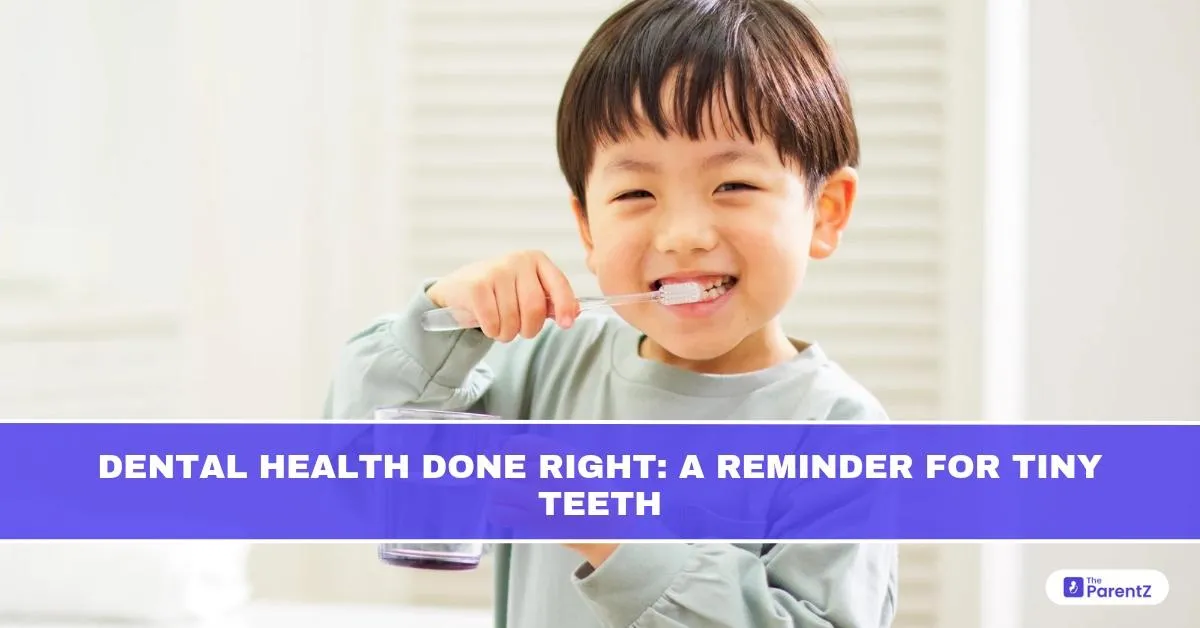Whether your child has just sprouted their first tooth or already leaves a trail of wobbly ones behind, this article offers a practical and loving reminder that oral health is family health and you’re doing more than just brushing teeth; you’re building confidence, comfort, and lifelong habits.
When Should Dental Care Begin?
The answer might surprise many: before the first tooth appears.
- Gum care starts from birth. Clean your baby’s gums daily with a soft, moist cloth to remove milk residue and prevent bacterial buildup.
- First tooth, first dental visit. As per the Indian Society of Pedodontics and Preventive Dentistry (ISPPD), children should have their first dental check-up by one year of age or within six months of the first tooth eruption.
Early visits aren’t just for checking cavities; they’re crucial for guiding parents on teething, brushing, diet, and habits like thumb sucking or bottle feeding.
Why Tiny Teeth Matter Big Time
It’s a myth that baby teeth “don’t matter because they fall out.” In reality, primary teeth are essential for:
- Proper chewing and nutrition
- Speech development
- Guiding permanent teeth into place
- Building a child’s self-esteem and social confidence
If left untreated, cavities in baby teeth can cause pain, infections, sleep problems, and even missed school days in later years.
Brushing Basics by Age
Let’s break it down stage by stage:
Infants (0–1 year)
- Use a soft cloth or silicone finger brush
- Avoid putting baby to bed with a milk bottle
- Watch for signs of teething, soothe with cold teething rings, not sugary gels
Toddlers (1–3 years)
- Introduce a soft-bristled toothbrush and rice grain-sized fluoride toothpaste
- Brush twice a day, morning and night
- Supervise and make it fun (songs, games, mirror time)
Preschoolers (3–6 years)
- Increase toothpaste to pea-sized amount
- Encourage spitting but avoid rinsing too much
- Teach circular motions and brushing all surfaces
School-age Children (6+ years)
- Teach flossing once teeth touch
- Use fluoride mouthwash only if recommended by your dentist
- Monitor brushing until at least age 8
What About Cavities in Milk Teeth?
Tooth decay in children, or early childhood caries (ECC), is alarmingly common in India. Causes include:
- Frequent snacking on sugary foods
- Bedtime feeding habits
- Poor brushing technique
- Delayed dental visits
The best defense? Prevention:
- Regular check-ups every 6 months
- Fluoride varnish application (safe and dentist-applied)
- Fissure sealants in molars to prevent deep decay
Nutrition and Oral Health
Diet plays a huge role in dental health.
Encourage:
- Calcium-rich foods: Milk, paneer, curd, almonds
- Fibrous fruits and veggies: Apples, carrots, cucumbers help clean teeth naturally
- Limited sugars and sticky snacks
Avoid:
- Sugary juices and flavored milk
- Sticky sweets, toffees, and packaged snacks
- Constant grazing (frequent small meals)
Tip: Water is the best beverage between meals, after brushing, and after sweet treats.
Habits to Watch
Some habits can impact dental alignment and oral development:
- Thumb sucking beyond age 3
- Mouth breathing
- Prolonged bottle use
- Tongue thrusting or lip biting
Your pediatric dentist can guide habit correction early using behavior therapy or habit-breaking appliances if needed.
A Dental Checklist
- Schedule your child’s next dental visit
- Replace old toothbrushes every 3 months
- Make brushing a family routine
- Educate without fear, talk about teeth as part of health
- Encourage healthy snacks and drinking water
- Stay updated on dental milestones (first molar, permanent teeth, etc.)
Conclusion
Caring for your child’s teeth is not just about avoiding cavities—it’s about teaching self-care, confidence, and discipline early in life. Your involvement and awareness as a parent are the greatest gifts you can give your child’s smile.





Be the first one to comment on this story.